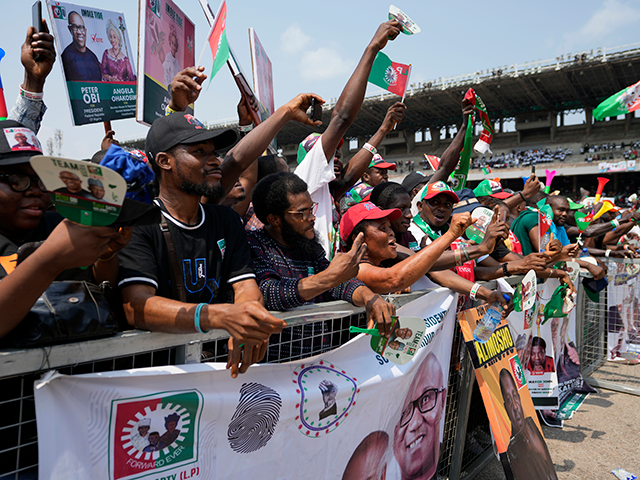Nigeria’s presidential election is scheduled for Saturday, pending a last-minute suspension, which is not unheard-of. The frontrunner remains upstart third-party Christian candidate Peter Obi, the runaway favorite with young Nigerian voters.
The final round of polling revealed a huge number of undecided voters, presenting plausible roads to victory for the candidate of the incumbent ruling party, Bola Ahmed Tinubu, and his rival from the traditional Nigerian two-party political see-saw, Atiku Abubakar.
Region, religion, and ethnicity are normally significant factors in Nigerian elections, which is why the two main parties – Tinubu’s All Progressives Congress (APC) and Abubakar’s People’s Democratic Party (PDP) – usually punt the presidency back and forth.
Obi, the lone Christian among the frontrunners, originally sought the PDP nomination but decided to run from a relatively small third party when Abubakar was chosen instead. Abubakar is an experienced campaigner, a former vice president who has already taken five shots at the top job.
Until Obi unexpectedly surged to the top of the polls, Tinubu was ranked as the leading candidate. APC is already in power under outgoing President Muhammadu Buhari and, while Nigerians as a whole are not exactly thrilled with Buhari’s performance in office, his political machine is impressive. The modest Labor Party has no comparable political artillery to put behind Obi.
Young voters are the wild card, as they are disgusted by the Nigerian political establishment and view Obi as a chance to shake up a moribund system. Tinubu’s campaign slogan is literally “It’s My Turn,” which is not a big hit with young voters looking for a change.
Tinubu has been acting like the election is in his pocket, by skipping debates and dodging media inquiries, and by choosing another Muslim as his running mate instead of a Christian. The presidential ticket is usually split between Muslim and Christian to draw as many voters as possible.
The deciding factor often boils down to which candidate comes from the opposite side of the country as the incumbent, as northern and southern Nigeria trade possession of the presidency. Buhari is from northern Nigeria and Obi is from the southeast, which would normally work in Obi’s favor, but he hails from the Igbo tribe, a group that usually fares better in business than politics.
“I’m well-experienced; I ran for President in 2007 and I’m not sure Nigerians are yet ready for a president of Igbo extraction. I’m not sure because I have tried to nose around that. We have five other regions to come up with and I am not sure,” Igbo APC lawmaker Orji Kalu mused on Wednesday.
“We do politics with emotions and I want Igbos to stop doing politics with emotions; I want Igbos to do practical politics,” said Kalu.
Despite the sensational polls showing Obi racking up an unprecedented double-digit lead, APC head of election planning Babatunde Fashola might be right to expect a “comfortable win” for Tinubu. Kalu also said he expected Tinubu to win.
Obi’s vivacious young voters, who refer to themselves as “Obedients,” might not show up on election day. Some predictive models expect Tinubu to win if turnout is low, and insecurity in several parts of Nigeria could keep many voters away from the polls.
“This is one of the closest elections that has ever been held in the history of this country,” communications professor Abiodun Adeniyi of Baze University said on Wednesday.
President Buhari held his final political rally on Tuesday, pledging to work for the “reliable” Tinubu and other APC candidates.
“As I mentioned before, Tinubu is a true believer in Nigeria, who loves the people and the development of our country,” Buhari said.
France24 on Monday saw Obi’s candidacy as the best chance to shake up Nigeria’s two-party system and the acid test for a youth movement that began with the EndSARS campaign of 2020. EndSARS started as a protest movement against Nigeria’s notoriously violent and abusive Special Anti-Robbery Squad, but grew into a more generalized revolt against corruption and the unfair distribution of Nigeria’s oil wealth.
France24 noted some admiring comparisons between Obi’s third-party dash for the finish line and the political career of French President Emmanuel Macron, but pointed out Obi’s problems with traditionally low youth voter turnout, the Igbo ethnic issue, and problems with getting Nigerian Muslim voters to line up behind a Christian candidate.
On that score, one final complicating factor in the home stretch of the Nigerian presidential race is that one other candidate is polling well enough to be considered a top-tier contender, former defense minister Rabiu Musa Kwankwaso of the New Nigeria People’s Party (NNPP).
Kwankwaso does not appear to have the votes to win outright, but he does have strong pockets of support among northern Muslims whose votes are vital to Tinubu and Abubakar. This means Kwankwaso could easily become a spoiler candidate who siphons enough voters to hand Obi the win.
If the election proceeds to a second round, Kwankwaso could become a kingmaker eagerly courted by the others – probably including Obi, who at one point was considering an outsider fusion ticket with Kwankwaso that might have become unbeatable in the 2023 race.
Kwankwaso has said he is only interested in the top spot, and his supporters are convinced he has much broader support than the polls indicate, but he might become an interesting player in a second election round if he sees no path to victory.

COMMENTS
Please let us know if you're having issues with commenting.